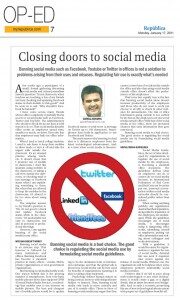Banning social media such as Facebook, YouTube or Twitter in offices is not a solution to problems arising from their uses and misuses. Regulating fair use is exactly what’s needed
A few weeks ago, a participant of a small, formal gathering discussing social media and citizen journalism raised a question: “In my classroom, when teachers are teaching, a few of my friends are busy checking and updating Facebook status in their mobile. Is this good?” And he went on to ask: “Why shouldn’t Facebook be banned?”

I have come across many friends whose office completely or partially blocks access to social media such as Facebook, Twitter and YouTube. The administrators who decide to block the access have a solid reason to do so: That social media disturbs office works as employees spend time, usually too much, on them. They also fear that employees may leak out office information.
When I used to teach college students, I used to ask them to keep their mobiles in silent mode or turn it off and take the urgent calls outside the classroom. It’s an unusual practice among teachers. It doesn’t mean that I promote use of mobile in classrooms. I don’t like students using mobiles in the classroom, or taking a call even outside the classroom, or checking mail or text message or Facebook status when I am explaining something to them. But when they are allowed to keep the mobiles in the classrooms, it’s absurd to be too stern about using them.
The simplest answer to my friend’s question is: “No, it’s not good to check and update Facebook status while in the classroom.” It’s undesirable not only in classrooms, but also in personal or professional meetings.
However, I am against banning of the social media in any office.
Banning social media is an extreme step. That however is followed by many institutions and offices. Banning Facebook has become a standard practice in many offices – media, NGOs, private organizations or even government organizations.
But banning social media hardly work. One reason behind this is the growing number of smartphones. Even very basic mobile phones these days supports GPRS (General Packet Radio Service), a technology that enables user to use internet on mobile phones. The best and cheapest use of mobile phone would be to update Facebook status or send tweet (a message on Twitter up to 140 characters). Smartphones have built-in application to use Facebook and Twitter.
The main reason why banning is a bad idea is it distances employees from the latest technological advancement. And, at a time when social media is threatening to be the dominant form of information exchange, and that the global talk is about how social media can be best used for benefits of organizations, banning it is akin to taking a step backward.
Psychology defines human nature as being curious, more so with things that are hidden or banned. Thus, banning social media only leads to more curiosity and use of it outside office. Those in favor of banning social media may argue that they cannot control use of social media outside the office and also that using social media outside office doesn’t affect the performance of the employees.
That’s true but equally true is the fact that banning social media alone doesn’t increase productivity of the employees and those who do not want to work can choose to sit idly or check in other websites for amusements. The risk of office information going outside is not curbed by the ban as the employees can use social media outside office. With ban of the social media in the office, there are increased chances that such information flow goes unnoticed.
Banning social media is a bad choice. The good choice is regulating the social media use by formulating social media guidelines.
SOCIAL MEDIA GUIDELINES
Social Media Guidelines, the set of rules developed by organizations to regulate the use of social media by the employees, is becoming a standard office document. The guidelines defines what an employees can do or cannot do on social media because, as International Federation of Red Cross and Red Crescent Societies put out, ‘personal conversation within social media networks should be considered public rather than private’.
When writing anything publicly, any organization desires that their reputation, along with the reputation of the employees, are undamaged. While the guidelines encourages use of social media, it discourages using it hampering office works, identifying oneself as employees, putting out office information and writing about colleagues and work environment.
With a guideline, it would be easier for organizations to regulate the use of social media, demand fair use and, if required, take action against the misuse of social media. Without one, the organizations will be helpless when some employees perform undesirable social media activities.
I believe that if we fail to pace along with technological or any other development, it would create a gap, or a digital divide, that at times becomes non-bridgeable. And, in such a scenario, promoting fair use of new technological advancement with proper set of guidelines benefits all.
[This article was published on the Op-Ed page of the Republica national daily]

0 responses to “Closing doors to social media”
I have never read such an absurd article. Shame on you. Why? The employers whether a government (the government employees are paid from our tax) or a company, does not pay you to read or upload your facebook. The employer has every right to ban all websites and emails that distract performing the assigned job and with the expected level of efficiency of the employee.
When I worked for Japanese Government for sometime, I remember how my colleagues were following the rules and ethics of not misusing public property or time they are supposed to dedicate on the job. In our field trips, I remember my colleagues were keeping eye on each other. As soon as it was 12 noon they started to read the newspaper, and took the lunch, and they were rushing to read the news paper and lunch as a set of parallel processes because they have to finish both and return to work at 1pm. In one of my early trip with them, I asked them why do you worry that much 12 to 1pm, their answer was “we work for government, and get salary from tax collected from people, and if people see us reading newspaper during regular office hours, people have right to ask the reason, and report, and we may get fired.
Even though we don´t see people around here, we should not do it, because we also don´t want other government employees to do the same. So, there can not be double standard, and therefore, we should be honest to ourselves before expect others to be honest.” That was a very important eye-opening experience to me.
When I was government employee back home, one of my classmate and colleague used to go to office at 9am and sign on the attendance sheet for previous days 5pm checkout signature, and the same day´s 10am clock in, and leave the office. He was not alone, there were many like him. Allowing employees to surf these social network websites is equivalent to leaving the office early. “Kam chor” (working something else, and cheating the work time) has become our culture in Nepal.
Last week, I was in a bank to open an account, and I forgot to take one important number with me, and it was in my hotmail account. When the Bank associate could not complete without the number, and he allowed me to use his computer to dig out the number from my hotmail, he asked me to sit on his chair and use his computer. As I tried to open the hotmail.com, the system denied. Then, he told me that it might be because the system restricts all websites outside the coroporate websites to everyone. It is the culture in developed countries.
But, in our country, a teacher like you promote “Kaam Chori”, because for our teachers there is no distinction between who pays the money, and for what you get the money. You think that the salary is granted, no matter how hard we work to pay the tax to pay salary of the teachers like you. That is why you should be ashamed for promoting such silly ideas.
Well, yes, in US too, students in university and colleges have temptation of using cell phones in classroom, but teachers and university have strict code of conduct. If you don´t follow the rule and switch off the power, you as a teacher or employer or boss have right take stern action against your misbehavior, and sometime you may get fired from job.
You as an educated person or an educator should be model to the people, not pose as a bad guy promoting misuse of someone´s money (as time is money. ) In Nepal, what we need is strict laws against the “Kaam Chors”, and enforce code of conduct no matter who you are. School or college is a place to learn and practice the rules, and codes of conduct, otherwise, you will be producing worthless people who have certificates in paper, but useless at workplaces.
That is the problem with TU in these days, and the students you teach at this moment are blackening their own teachers , VC, and Registrars …. It is all because leaders like are suggesting them that it is OK to cheat work and time of employers. Eventhough you did not say that it is ok to cheat your employer, but the idea you are suggesting is indirectly supporting the notion. That is why shame on you.
@GyaRel: I will say either you did not paid much attention to whole story or misunderstood it. I am neither promoting use of social media in classrooms or in offices while they should be working rather I am saying that proper social media guideline – rather thank blocking those sites – is the best option to cope with the problems arising from use/misuse of social media.
During officer hours, there is no way, you can regulate. Answer is plain, “NO”. Deny all social networks while you are in your office at someone else’s expense. If you are so worried about technological advancements, then get internet connection and a computer at home. If you cannot afford a computer, then go to public internet cafe after office hours. If you don’t have interest to do one or both of these two, then you just keep quiet. Your logic on the closing paragraph was fully flawed. If someone does so in my company, then I will fire him for misusing my funds. Period. Well, in Nepal, your logic holds very well because they get paid low salary because they have habit of cheating the employer. That is the reason behind all these idea of regulating social media at work place. For me, the regulation is complete shut down of any social media at any work place.
????
??????????????????????????????????????Ion Magnum??????????????????????????????? ???????????????30????????????10?????????????5000?????????????????????????????????????????????????????????Ion Magnum???????????????????????? ??????????????????3-4?????????????????????????5????????20???????????????????????????????????????? . ??????25????????????????????1-2????????????????1-2???????
Girl’s Power????: ????????? Marie Claire (HK) Edition ????????????????????????????? ????????????????????????????????????????????????????????? Nike H
????????????????????????????????????????????????????????????????????????????????? :???????????? ???? : ????$1,000,000.00 ????????????????????? ????????????????? ???????????? ???? :????? ?????? ???
MISSHA ????????????? MISSHA M Dual Lash Intense Program(R)????? MISSHA,??,????????? MISSHA M Dual Lash Intense Program(R)
DERMAK ???? ???????? UrCosme (?cosme TAIWAN) ??? DERMAK ???? DERMAK ???? ????DERMAK ???????,????
L’OCCITANE ??? ???????????????????? L’OCCITANE ???,?????,????????
Focal ????????????? Whitening Toner????? Focal,??????,????? Whitening Toner
Thomas Muller became the leading German scorer in the Champions League on Tuesday night and engaged in a raucous exchange with supporters as Pep Guardiola’s side celebrated a famous win. Thomas Muller noises up fans after becoming highest German scorer in Champions League history as Bayern Munich run riot
Joey Barton has signed a four-year deal with QPR. Barton has been linked with several Premier League clubs since Newcastle made the midfielder available on a free transfer. Barton ends Newcastle stay as midfielder signs four-year contract with QPR